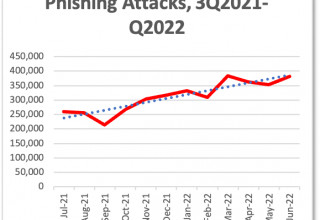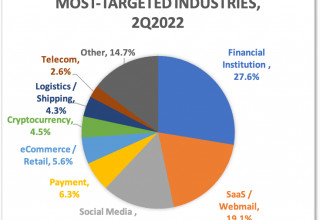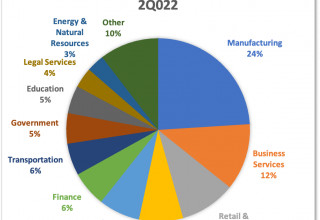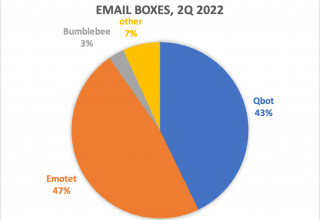APWG REPORT: Phishing Attacks Climb to New Record High in Q2 2022
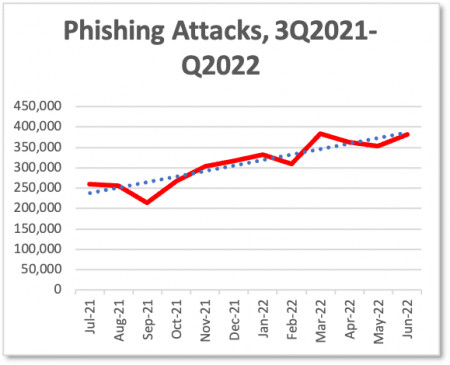
CAMBRIDGE, Mass., September 20, 2022 (Newswire.com) - The APWG's new Phishing Activity Trends Report reveals that in the second quarter of 2022, the APWG observed 1,097,811 total phishing attacks — the worst quarter for phishing that APWG has ever observed.
The total for June was 381,717 attacks or phishing sites. The number of phishing attacks reported to APWG has quadrupled since early 2020 — when APWG was observing between 68,000 and 94,000 attacks per month.
In the first quarter of 2022, APWG founding member OpSec Security found that phishing attacks against the financial sector, which includes banks, remained the largest set of attacks, accounting for 27.6 percent of all phishing.
Attacks against webmail and software-as-a-service (SAAS) providers remained prevalent as well, while attacks against retail/ecommerce sites fell from 17.3 percent to 14.6 percent after the holiday shopping season.
Phishing against social media websites rose, to 15.3 percent of all attacks.
Phishing against cryptocurrency targets — such as cryptocurrency exchanges and wallet providers — was 6.5 percent of the total, which made them more prevalent than attacks against online games, government sites, and telecom services combined.
Matthew Harris, Senior Product Manager, Fraud at Opsec, noted: "Lastly, we're seeing a huge increase in mobile phone-based fraud, with smishing and vishing collectively seeing a nearly 70 percent increase in volume as compared to Q1 totals."
"We are still seeing fraud coming in via the typical OTT apps (WhatsApp, WeChat, Facebook Messenger, etc.), but the SMS-based fraud is really the kicker here," Harris said.
Crane Hassold, Director of Threat Intelligence at APWG member Abnormal Security, analyzed the ransomware activity over the quarter. "The transportation industry saw the largest growth in ransomware victims," Hassold said. "The healthcare industry, which has long been a concerning target of ransomware attacks, also experienced a significant increase in attacks in the second quarter, growing 53 percent compared to the first quarter."
"Business e-mail compromise," or BEC, is a scam that affects large and small companies. When scammers try to fool victims into making a wire transfer to the scammer, Agari found that the average amount requested was $109,467, up from $91,436 in Q1 2022, the highest average the company has seen since Agari started tracking the data.
"The industry is quite good at keeping malware out of enterprise user inboxes," said John Wilson, Senior Fellow, Threat Research at HelpSystems. "However, that's not the case for phishing emails that steal credentials or elicit a response (like BEC). Ninety-five percent of the threats found in enterprise user inboxes in Q2 were either credential theft or response-based attacks."
The full text of the report is available here: https://docs.apwg.org/reports/apwg_trends_report_q2_2022.pdf.
Media Contact: pr@apwg.org or tel:+1 617 669 1123
Founded in 2003, the Anti-Phishing Working Group (APWG) is the global industry, law enforcement, and government coalition focused on unifying the global response to electronic crime. Membership is open to qualified financial institutions, online retailers, ISPs and Telcos, the law enforcement community, solutions providers, multilateral treaty organizations, research centers, trade associations and government agencies. There are more than 2,200 companies, government agencies and NGOs participating in the APWG worldwide. The APWG's www.apwg.org and education.apwg.org websites offer the public, industry and government agencies practical information about phishing and electronically mediated fraud as well as pointers to pragmatic technical solutions that provide immediate protection. The APWG is co-founder and co-manager of the STOP. THINK. CONNECT. Messaging Convention, the global online safety public awareness collaborative (https://messagingconvention.org) and founder/curator of the eCrime Researchers Summit, the world's only peer-reviewed conference dedicated specifically to electronic crime studies (www.ecrimeresearch.org). APWG advises hemispheric and global trade groups and multilateral treaty organizations such as the European Commission, the G8 High Technology Crime Subgroup, Council of Europe's Convention on Cybercrime, United Nations Office of Drugs and Crime, Organization for Security and Cooperation in Europe, Europol EC3 and the Organization of American States. APWG is a member of the steering group of the Commonwealth Cybercrime Initiative at the Commonwealth of Nations. Among APWG's corporate sponsors are: 418 Intelligence, Abnormal, Accenture, Acronis, Afilias, AGARI by HelpSystems, AhnLab, AT&T, Allure Security, AREA 1, AIT, appgate, Asurion Insurance Services, Avast, Awayr AI, AXUR, BW CIRT, Bambenek Consulting, Banelco CSIRT, Bolster, BrandShield, Browlser, ByteDance, Canva, CaixaBank, Check Point, Cisco, CLARO, Cloudflare, CLOUDMARK, COFENSE, Coinbase, Comcast, CSC, CSIRT BANELCO, CSIS, Cyan Digital Security, CYREN, Cyxtera, CZ.NIC, DS Lab, DigiCert, dmarcian, DNS Belgium, DomianTools, EBRAND, Entrust Datacard, ESET, Facebook, FirstRand, Fortinet, FraudWatch, GetResponse, GERNE Technology, GMS Securidad, GoDaddy Registry, Group-IB, Guidewire. HelpSystems, Hitachi Systems, .ID, ICANN, Infoblox, Ingressum, INKY Technology Company, IQ Global, iThreat, Kaspersky, KnowBe4, Lenos Software, LINE, Looking Glass, LSEC, Mailshell, McAfee, Microsoft, Mimecast, NCA, NAVER, Netcraft, NetSTAR, Nominet, Opera, OpSec Security, Palo Alto Networks, PANDI, PayPal, PhishLabs by HelpSystems, Proofpoint, Qintel, Rakuten, Recorded Future, Redsift, REDIRIS, ReversingLabs, RiskIQ, RSA, S2W Lab, SafeGuard Cyber, Salesforce, Secutec, SIDN, SlashNext, Sopos, SWITCH, Symantec, Tessian. Thomsen Trampedach, ThreatSTOP, TNO, TrendMicro, Trustwave, Twilio, Unbiased Security, Vade, Verisign, Viettel Cyber Security, Webroot, workday, ZeroFOX, ZibaSec, Zimperium, ZIX, and zvelo.
Source: APWG
